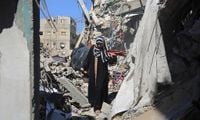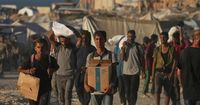In a move that’s being hailed as both historic and fraught with complexity, the UK government has approved special arrangements to allow around 40 students from Gaza to begin fully funded university studies in Britain this autumn. The decision, confirmed on August 26, 2025, comes after months of mounting pressure from academics, advocacy groups, and politicians concerned about the welfare of Gazan students trapped by the ongoing conflict with Israel.
According to BBC News, the Home Office has agreed to adapt immigration protocols, granting these students a unique pathway to their studies. The students, some of whom are recipients of the prestigious Chevening scholarships, will be permitted to undergo required biometric checks—including photographs and fingerprints—in a third country. This workaround became necessary after the Visa Application Centre in Gaza was shuttered following the October 7, 2023, Hamas attacks, leaving would-be scholars in limbo.
While the UK has cleared a bureaucratic path, another hurdle remains: the Israeli government must approve each student’s departure from Gaza. This requirement is especially pressing as diplomatic relations between London and Tel Aviv have cooled in recent months. UK Prime Minister Keir Starmer recently announced that Britain would recognize a Palestinian state if Israel fails to take concrete steps toward a truce with Hamas, a move that has further complicated the political landscape, as reported by News24.
Of the roughly 40 students set to travel, nine are due to pursue master’s degrees under the Chevening scheme—a UK government-funded initiative designed to foster future leaders worldwide. The remaining students have secured fully funded scholarships through private schemes, all of which have been approved by Home Secretary Yvette Cooper. The Home Office, in statements echoed across outlets including The Guardian and Jewish News, described the arrangements as “complex and challenging,” but underscored Cooper’s determination: “The Home Secretary has made it crystal clear to her officials that she wants no stone unturned in efforts to ensure there are arrangements in place to allow this cohort of talented students to take up their places at UK universities as soon as possible.”
The stories behind the headlines are deeply personal and, at times, heartbreaking. Take Mahmoud, a 27-year-old doctor from Beit Lahia in northern Gaza, who was offered a place to study global health policy at the London School of Economics. He told BBC News, “I was highly emotional and so happy to be awarded the scholarship. It gave me the energy to keep working. But most of the time, I avoided talking about it, because of the indefinite uncertainty.” Mahmoud volunteered in the plastic and reconstructive surgery unit at al-Shifa hospital during the war, and later worked across temporary wards in Gaza. His hope is to return and help rebuild the territory’s fragile healthcare system.
Another scholar, Mohammed, 25, will study at the University of Glasgow. He sees his opportunity as a duty, not an escape: “This opportunity is not an escape. It is a responsibility to study, to learn and to return stronger for them. What I learn in Glasgow will not stay in lecture halls. It will be carried back to serve people who need it.”
But the process has not been without its critics and complications. Nora Parr, a University of Birmingham researcher who has been coordinating support for the students, urged the government to provide more transparency and guidance. Speaking to Research Professional News, she said, “We’re very glad to see the UK government beginning to put things into place to make sure that we can welcome the students in the autumn term. However, we don’t know many details—we don’t know who is included and by what criteria they are included.”
One particularly thorny issue is whether the students will be allowed to bring dependants with them. UK immigration rules typically restrict dependants for international students except for those on postgraduate research courses. As a result, some scholars face agonizing choices. Parr recounted the story of a mother, a physician set to study child and maternal health, who was told she must leave her two-year-old daughter behind to accept her scholarship. “How can you study child health knowing that your own child is unsafe?” Parr asked, echoing the anguish felt by many in similar situations.
The uncertainty has led to calls for the government to recognize the exceptional severity of the situation and to consider exceptions for dependants in cases where students can demonstrate the means to support their families. “Nobody’s asking for handouts. Everybody is simply asking to be able to do the best they can,” Parr said.
Support for the initiative has come from across the higher education sector. Naimat Zafary, a Chevening scholar from Afghanistan who arrived in the UK in 2022, told RPN that facilitating students’ entry should focus not only on practical support but also on “recognizing and nurturing the potential that these scholars bring with them.” Ruth Arnold, executive director of external affairs at Study Group, called the government’s acceptance of Gazan students “a landmark decision,” adding, “Experience shows that those who are welcomed to the UK in such devastating circumstances in fact go on to make a profound contribution to this country and the world.”
The Chevening scheme, which offers fully funded international scholarships and fellowships for specialist short courses or research placements at UK institutions, has long prioritized fostering global leadership. This year’s cohort from Gaza will join a network of alumni already making an impact in fields like climate action, economic prosperity, and conflict recovery, according to the Chevening Awards’ official channels.
Yet, as the academic year approaches, there remains a sense of liminality. An open letter signed by more than 4,800 UK university staff has urged the government to clarify whether this is a one-off gesture or the beginning of a broader, more inclusive policy. The letter also identified a further 40 students and scholars still awaiting scholarship decisions and private funding, underscoring the ongoing administrative and humanitarian challenges.
Meanwhile, the UK government is also working to bring sick and injured children from Gaza to Britain for urgent medical treatment. According to Unicef, more than 50,000 children have been killed or injured in Gaza since October 2023. While a small number have already been brought to the UK for specialist care via Project Pure Hope, the scale of need remains overwhelming.
As September draws near, the fate of Gaza’s scholars hangs in the balance—caught between the promise of education and the realities of war and bureaucracy. For now, the UK’s decision offers a glimmer of hope, both for the students and for the idea that, even in the darkest of times, doors can still be opened.





